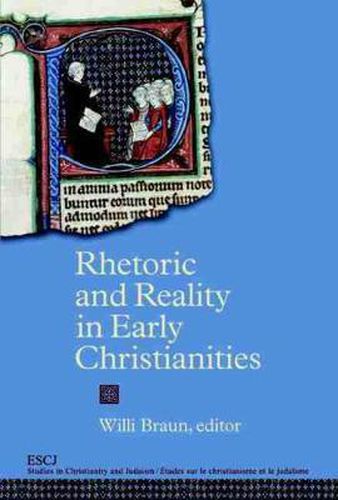Readings Newsletter
Become a Readings Member to make your shopping experience even easier.
Sign in or sign up for free!
You’re not far away from qualifying for FREE standard shipping within Australia
You’ve qualified for FREE standard shipping within Australia
The cart is loading…






One of the most pressing issues for scholars of religion concerns the role of persuasion in early Christianities and other religions in Greco-Roman antiquity. The essays explore questions about persuasion and its relationship to early Christianities. The contributors theorise about persuasion as the effect of verbal performances, such as argumentation in accordance with rules of rhetoric, or as a result of other types of performance: ritual, behavioural, or imagistic. They discuss the relationship between the verbal performance of rhetoric and other performative modes in generating, sustaining, and transmitting a persuasive form of religiosity. The essays in this book cover a wide chronological range (from the first century to late antiquity) and diverse topical examples contribute to the collection’s thematic centre: the relations among formalised and technical verbal performances (rhetoric, texts) and other forms of persuasive performances (ritual, practices), the social agendas that early Christians pursued by means of verbal, rhetorical performances, and the larger social context in which Christians and other religious groups competitively jockeyed to attract the minds and bodies of audiences in the Greco-Roman world.
$9.00 standard shipping within Australia
FREE standard shipping within Australia for orders over $100.00
Express & International shipping calculated at checkout
One of the most pressing issues for scholars of religion concerns the role of persuasion in early Christianities and other religions in Greco-Roman antiquity. The essays explore questions about persuasion and its relationship to early Christianities. The contributors theorise about persuasion as the effect of verbal performances, such as argumentation in accordance with rules of rhetoric, or as a result of other types of performance: ritual, behavioural, or imagistic. They discuss the relationship between the verbal performance of rhetoric and other performative modes in generating, sustaining, and transmitting a persuasive form of religiosity. The essays in this book cover a wide chronological range (from the first century to late antiquity) and diverse topical examples contribute to the collection’s thematic centre: the relations among formalised and technical verbal performances (rhetoric, texts) and other forms of persuasive performances (ritual, practices), the social agendas that early Christians pursued by means of verbal, rhetorical performances, and the larger social context in which Christians and other religious groups competitively jockeyed to attract the minds and bodies of audiences in the Greco-Roman world.